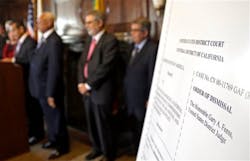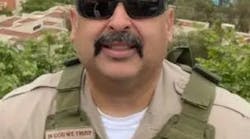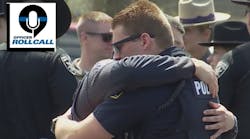The federal judge who oversaw a dramatic, forced transformation of the Los Angeles Police Department has freed the department from the final vestiges of federal oversight.
In a brief, three-line order Wednesday, U.S. District Judge Gary Feess formally lifted the binding agreement the U.S. Department of Justice imposed on the LAPD in 2001, which spelled out dozens of major reforms the police agency had to implement and frequent audits it was required to undergo by a monitor who reported to Feess.
The dismissal of the so-called consent decree, which arose largely out of the Rampart corruption scandal and addressed basic problems of accountability that stretched back decades, delivered a largely symbolic, but nonetheless important milestone for the LAPD as it continues to disassociate itself from a past marked by abuses and turmoil. Following revelations in 1999 that officers assigned to the LAPD's Rampart Division were implicated in serious misconduct, including physical abuse of suspects, evidence tampering and perjury, public trust in the police plummeted and federal officials responded to calls from a growing chorus of critics for intervention.
Though many in the department bitterly disliked the idea of federal oversight, Department of Justice officials threatened to sue the city for complete control of the LAPD if department and city officials resisted the idea of the consent decree.
"In these last 12 years the Los Angeles Police Department did not just comply with the consent decree, they took it to heart. They used it as a guide to change their culture," Mayor Antonio Villaraigosa said at a late afternoon news conference with Police Chief Charlie Beck and members of the Police Commission, the civilian board that oversees the department. "The entire department, from the officers on the beat in the neighborhoods to the top brass downtown, have made these reforms their reforms."
Although his predecessor, Bernard Parks, was lukewarm on it, former Chief William J. Bratton, who ran the department from late 2002 to 2009, embraced the consent decree. An outsider hired on his reputation for overhauling large, troubled police departments, Bratton used the decree as a ready-made blueprint for remaking the LAPD. Under the terms of the decree, the LAPD was required to revamp its tools for tracking officer misconduct, investigations into cases involving force by officers, training, an independent watchdog office and more.
In 2006, however, as the decree was set to expire, Feess angrily rebuked the department for what he found to be its slow pace of reform and extended the decree for five years.
As the years wore on, Bratton and other senior LAPD officials grew increasingly impatient with the judge's refusal to loosen his grip on the department and called openly to be let out from under the consent decree. The department, they argued, had implemented the vast majority of the reforms called for in the decree, proved its ability to operate responsibly and needed the freedom to run on its own. Bratton pointed out frequently that about two-thirds of the department's roughly 10,000 officers had joined the force while it was under the decree -- a sign, he said, that the department had, in fact, broken with its unsavory past.
On the eve of Bratton's departure, Feess relented and approved a transitional plan that called on the Los Angeles Police Commission, which oversees the LAPD, to assume responsibility for keeping tabs on the department's efforts to fully implement the few issues that had not yet been completely addressed. If Department of Justice lawyers were unsatisfied with the commission's oversight, the agreement allowed them to object and bring the department back before Feess.
With Wednesday's order, Feess severed that remaining authority, leaving the LAPD fully as its own master for the first time in 12 years. With the transition agreement completed, Feess had been waiting for Department of Justice officials to file necessary paperwork before taking his final step, police officials said.
Hector Villagra, executive director of the ACLU of Southern California, praised Bratton, Beck and Villaraigosa for their "stewardship" in seeing the consent decree through. The reform package, he said in a statement, has "accomplished its purpose by and large. This is no longer your father's Los Angeles Police Department. The LAPD has made serious culture changes."
Villagra, however, cautioned that the department must guard against backsliding into its old ways and had more work to do on "persistent racial disparities in policing" and officers' treatment of homeless people.
Andrea Ordin, the president of Police Commission, echoed Villagra, saying at the news conference that "there's lots more to do, we know that. But it should be done by the department."
Beck credited the department's officers for adopting the changes imposed on them from the outside. He reserved special praise for an advisor, Gerald Chaleff, who worked closely with him and Bratton on putting the decree in place. "Without him, this new day would never have dawned," Beck said of Chaleff.
"The consent decree has made this a department that I am proud to hand over to my children," said Beck, who has a daughter and son on the force. "It has been the catalyst for incredible change in my Police Department. We've become accountable, we've become transparent and we've become more effective than we've ever been."
Copyright 2013 - Los Angeles Times
McClatchy-Tribune News Service



